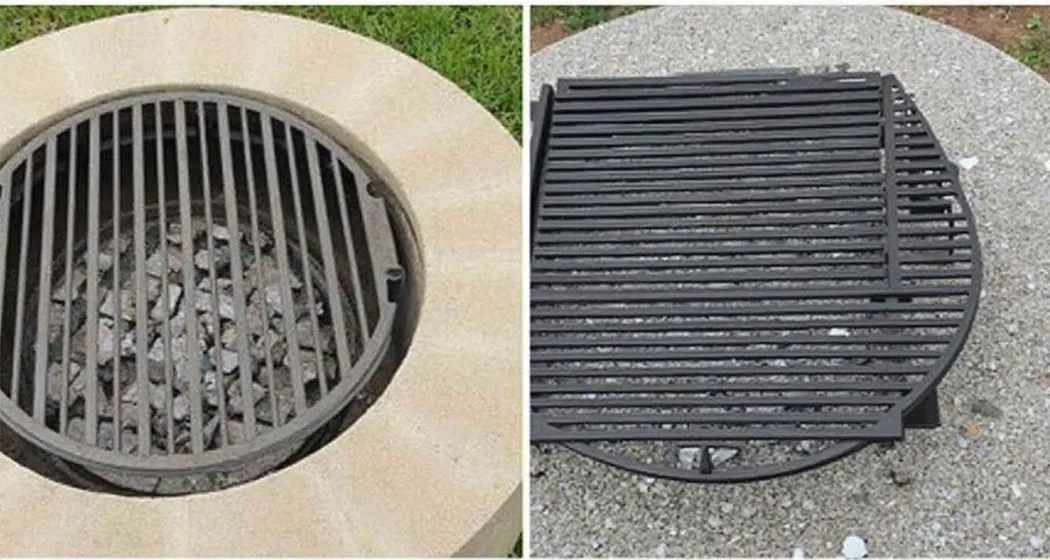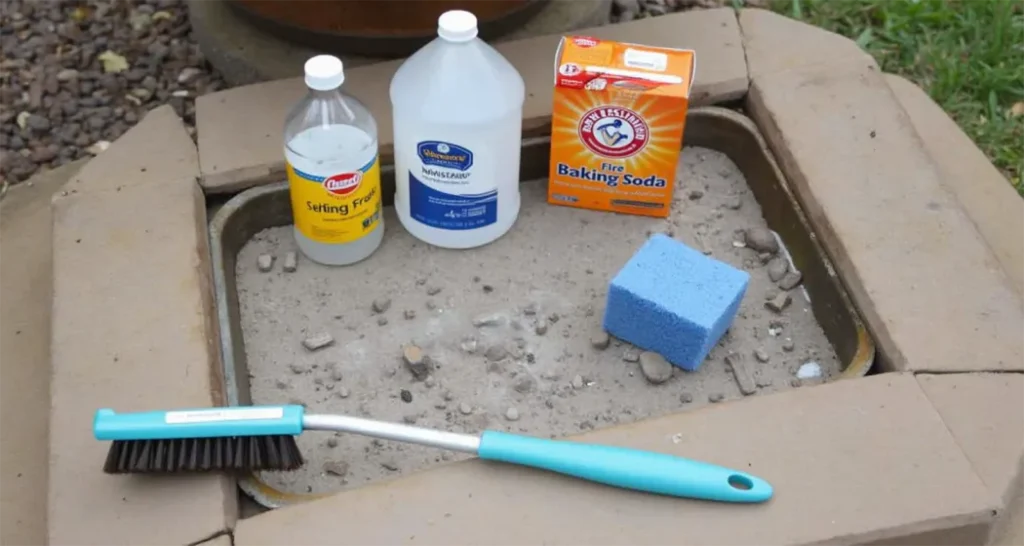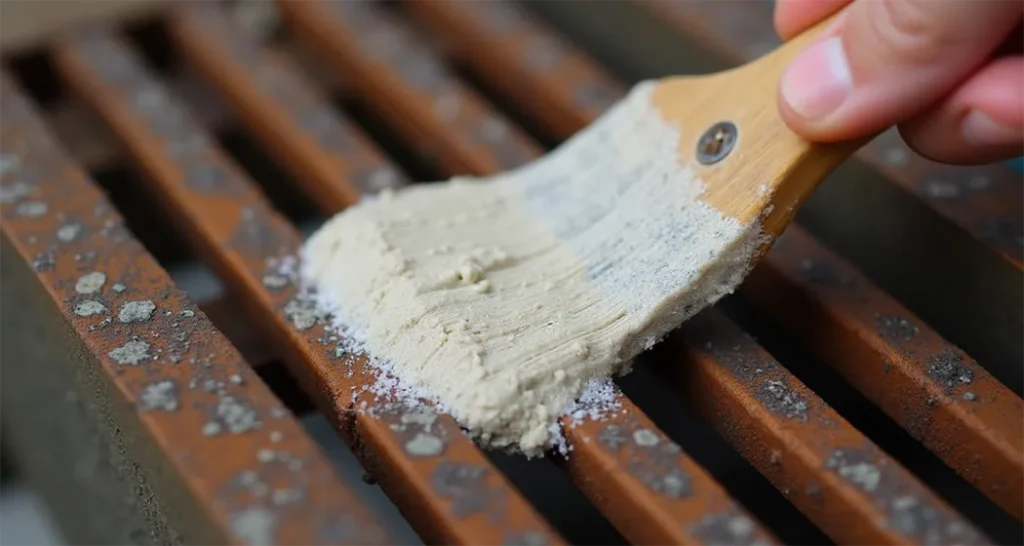
How to Clean and Maintain Your Fire Pit Cooking Grate: A Complete Guide
Your fire pit cooking grate is the backbone of your outdoor cooking adventures. Whether you’re grilling juicy burgers, roasting vegetables, or toasting marshmallows, a clean and well-maintained grate ensures your food tastes great and your equipment lasts. Neglecting proper care can lead to rust, grease buildup, and even safety hazards. But don’t worry cleaning and maintaining your fire pit cooking grate is easier than you think. This guide will walk you through the steps to keep your grate in top condition so you can enjoy flawless outdoor cooking every time.
Want to take your fire pit cooking to the next level? Check out Creative Fire Pit Cooking Hacks for Amazing Meals for unique ideas and tips to transform your outdoor cooking experience.
1. Why Fire Pit Grate Cleaning Matters
Taking care of your fire pit grate isn’t just about appearances it impacts the quality of your cooking and the longevity of your gear.
- Better Tasting Food: A dirty grate can leave unpleasant flavors on your food, especially if residue or rust is present.
- Prolongs Lifespan: Regular maintenance prevents wear and tear, saving you money on replacements.
- Safety First: Grease and food buildup can harbor bacteria, posing a health risk. A clean grate ensures safe cooking for you and your guests.
- Explore these 10 Easy Fire Pit Cooking Recipes You’ll Love to put your freshly cleaned grate to use.
- Learn about the best fire pit cooking grates for every budget to find durable options that last.
2. Tools You’ll Need for Cleaning
Before diving into the cleaning process, it’s important to gather the right tools to ensure an efficient and effective job. Each of these tools plays a specific role in maintaining your fire pit cooking grate, making the process smoother and more manageable. Let’s break down their purpose and why they’re crucial:

Must-Have Tools for Effective Fire Pit Grate Cleaning
A sturdy wire brush is your best friend for scrubbing off tough residue, such as charred bits of food and grease. Opt for a grill-specific brush with durable bristles designed to withstand the high heat of fire pit grates. For delicate or coated grates, use a brush with softer bristles to avoid damage.
Effective Cleaning Agents: Dish Soap and Grill Cleaner
Grease and grime are no match for a good cleaning agent. Mild dish soap is perfect for everyday cleaning, while a specialized grill cleaner can tackle tougher buildup. Look for a non-toxic, biodegradable option to protect both your grate and the environment.
Warm Water:
Warm water isn’t just a basic cleaning agent it’s a game-changer. It loosens hardened food particles and softens grease, making scrubbing much easier. Pair it with soap or grill cleaner for optimal results.
Sponge or Cloth:
A sponge or soft cloth is essential for wiping down surfaces and removing residue after scrubbing. Use the abrasive side of the sponge for stubborn grime and the soft side for delicate finishes. Keep a dedicated cloth for drying your grate completely to prevent rust.
Natural Alternatives: Using Vinegar and Baking Soda
This natural powerhouse duo is ideal for tackling rust and deep-cleaning your grate. Baking soda acts as a gentle abrasive, while vinegar dissolves tough grime and rust. Together, they create a chemical reaction that lifts rust and stains, leaving your grate refreshed without harsh chemicals.
High-Temperature Oil:
Seasoning is crucial for cast iron grates, and high-temperature oil like vegetable or canola oil is your go-to. After cleaning, oiling your grate creates a protective barrier against rust and gives it a non-stick surface for seamless cooking.
Having these tools on hand ensures you’re well-prepared to tackle any cleaning challenge. Whether you’re doing a quick post-cook scrub or a deep clean, these items make the process straightforward, effective, and even enjoyable. A clean grate means better-tasting food and a longer-lasting piece of equipment so gather your supplies and get ready to give your fire pit grate the care it deserves.
- Looking for more tips? Check out camping tools and utensils to elevate your cooking game.
3. Step-by-Step Fire Pit Grate Cleaning Process
Cleaning your fire pit cooking grate immediately after use is the simplest and most effective way to keep it in top condition. This quick cleaning routine prevents food particles and grease from hardening, making your job much easier.
- While the Grate is Still Warm:
The residual heat from cooking works to your advantage by loosening grease and food residue. Take a sturdy wire brush and scrape off any stuck-on particles. Focus on areas where food tends to cling, such as the center of the grate or grooves. - Wipe the Surface:
Once the major debris is removed, take a damp cloth or sponge and wipe the entire surface of the grate. This step removes any lingering residue or grease and preps the grate for its next use.
Performing this quick post-cook cleanup consistently will save you from more intensive cleaning sessions later and keep your grate ready for action.
Deep Cleaning: Tackling Heavy Buildup
If your fire pit grate has heavy grime or grease buildup, a deep cleaning session will bring it back to life. Here’s how to do it:
- Remove the Grate:
Carefully take the grate out of the fire pit and place it in a sink, large basin, or tub for cleaning. - Soak in Warm, Soapy Water:
Fill the basin with warm water and add a few drops of dish soap or grill cleaner. Let the grate soak for 15–20 minutes to loosen tough grime and grease. - Scrub Thoroughly:
After soaking, use a sponge, scrubber, or brush to clean all surfaces of the grate. Pay close attention to corners, grooves, and edges where grease tends to accumulate. - Rinse Well:
Rinse the grate thoroughly under running water to remove all traces of soap. Any leftover residue can affect the taste of your food during your next cookout. - Dry Completely:
Use a clean towel to dry the grate completely. Leaving it wet can lead to rust, especially for cast iron grates. For added protection, you can air-dry the grate in a warm, dry place before storing it.
Deep cleaning doesn’t need to be a daily task, but incorporating it into your routine every few uses will keep your grate in excellent condition.
Dealing with Rust: Restoring Your Grate
Rust is a common enemy of fire pit grates, particularly those made of cast iron. While minor rust can be treated effectively, addressing it promptly prevents long-term damage.

- Mix Vinegar and Baking Soda Paste:
Mix equal parts of vinegar and baking soda until you achieve a thick, spreadable paste. This natural solution is safe and effective for breaking down rust without harsh chemicals. - Apply the Paste:
Spread the paste generously over the rusty areas of the grate. Let it sit for at least 30 minutes to allow the mixture to penetrate and loosen the rust. - Scrub the Rust:
Use a wire brush or scrubber to vigorously remove the rust. Work in circular motions for better results. For stubborn spots, apply more paste and repeat the process. - Rinse Thoroughly:
Rinse the grate under running water to remove any remaining paste or rust particles. Check to ensure all rust has been removed. - Dry and Protect:
Dry the grate completely to prevent further rusting. For cast iron grates, consider seasoning them with a thin layer of oil to add a protective coating.
By addressing rust as soon as it appears, you can extend the life of your fire pit grate and maintain its performance.
4. How to Season Your Grate
Seasoning is crucial for cast iron grates, as it prevents rust and creates a natural non-stick surface.
Steps for Seasoning:
- Coat the entire grate with a thin layer of high-temperature oil, such as vegetable or canola oil.
- Place the grate over a fire or in an oven at 375°F for about an hour.
- Let the grate cool completely and wipe off any excess oil.
Seasoning not only protects your grate but also enhances its cooking performance.
- Want to explore other ways to prepare your fire pit for cooking? Discover best practices for grilling outdoors.
5. Maintenance Tips to Keep Your Grate in Top Shape
A little regular maintenance goes a long way in preserving your fire pit grate:
- Clean After Each Use: Prevent food and grease from hardening by cleaning right after cooking.
- Store Properly: Always store your grate in a dry location to avoid exposure to moisture, which causes rust.
- Inspect Regularly: Look for signs of rust, warping, or damage and address them promptly.
- Use Protective Covers: Invest in a fire pit cover to shield your grate from the elements.
6. Avoid These Fire Pit Grate Cleaning Mistakes
Even with good intentions, some common mistakes can damage your grate:
- Leaving It Wet: Always dry your grate completely after cleaning to prevent rust.
- Using Harsh Chemicals: Strong cleaners can leave residue that impacts food flavor. Stick to natural or grill-specific products.
- Skipping Seasoning: For cast iron grates, seasoning is non-negotiable it prevents rust and improves cooking.
- Over-Scrubbing: Avoid excessive scrubbing that can damage coated grates.
7. When to Replace Your Fire Pit Cooking Grate
Even with the best care, your grate won’t last forever. Here’s when to consider a replacement:
- Excessive Rust or Corrosion: When rust compromises the integrity of the grate, it’s time for a new one.
- Warping or Bending: A deformed grate affects heat distribution and cooking efficiency.
- Flaking Coating: If the protective coating starts to peel, it can contaminate your food.
When replacing your grate, opt for durable materials like stainless steel or cast iron and ensure it fits your fire pit perfectly.
Cleaning and maintaining your fire pit cooking grate is a simple yet essential task that ensures safe, enjoyable, and long-lasting outdoor cooking experiences. With the right tools and techniques, you can keep your grate in excellent condition for years to come. So next time you fire up your grill, you’ll have a sparkling clean grate ready to deliver perfect results. Start today, and enjoy better-tasting food every time you cook.
